2014年高考新课标1全国卷英语试题及答案
2014年高考英语全国1卷听力(录音+原文+答案)

2014年高考英语全国1卷听力(录音+原文+答案)听力下载链接:https:///s/15fBZw6-1yj309FrPWC-lBg提取码:12342014全国卷听力试题第一部分听力(共两节,满分30分)做题时,先将答案标在试卷上。
录音内容结束后,你将有两分钟的时间将试卷上的答案转涂到答题卡上。
第一节(共5小题;每小题1.5分,满分7.5分)听下面5段对话。
每段对话后有一个小题,从题中所给的A、B、C三个选项中选出最佳选项。
听完每段对话后,你都有10秒钟的时间来回答有关小题和阅读下一小题。
每段对话仅读一遍。
例:How much is the shirt?A. £19.15.B. £9.18.C. £9.15.答案是C。
1. What does the woman want to do?A. Find a place.B. Buy a map.C. Get an address.2. What will the man do for the woman?A. Repair her car.B. Give her a ride.C. Pick up her aunt.3. Who might Mr. Peterson be?A. A new professor.B. A department head.C. A company director.4. What does the man think of the book?A. Quite difficult.B. Very interesting.C. Too simple.5. What are the speakers talking about?A. Weather.B. Clothes.C. News.第二节(共15小题,每小题1.5分,满分22.5分)听下面5段对话或独白。
每段对话或独白后有几个小题,从题中所给的A、B、C三个选项中选出最佳选项。
2014年全国卷高考英语试卷及答案
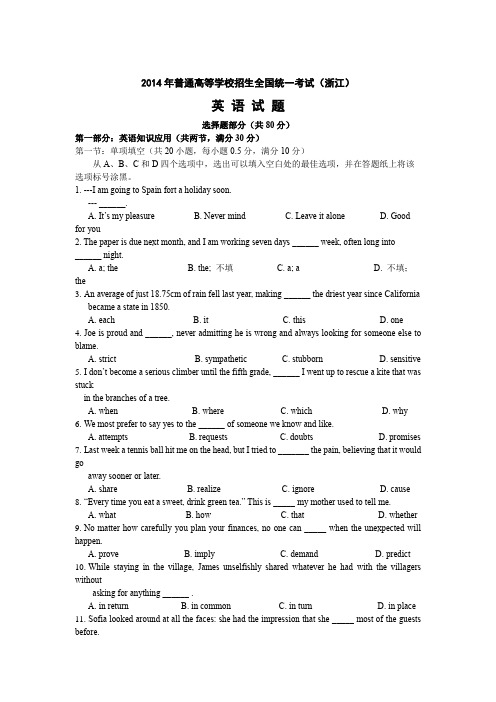
2014年普通高等学校招生全国统一考试(浙江)英语试题选择题部分(共80分)第一部分:英语知识应用(共两节,满分30分)第一节:单项填空(共20小题,每小题0.5分,满分10分)从A、B、C和D四个选项中,选出可以填入空白处的最佳选项,并在答题纸上将该选项标号涂黑。
1. ---I am going to Spain fort a holiday soon.--- ______.A. It’s my pleasureB. Never mindC. Leave it aloneD. Good for you2. The paper is due next month, and I am working seven days ______ week, often long into______ night.A. a; theB. the; 不填C. a; aD. 不填;the3.An average of just 18.75cm of rain fell last year, making ______ the driest year since Californiabecame a state in 1850.A. eachB. itC. thisD. one4.Joe is proud and ______, never admitting he is wrong and always looking for someone else to blame.A. strictB. sympatheticC. stubbornD. sensitive5.I don’t become a serious climber until the fifth grade, ______ I went up to rescue a kite that was stuckin the branches of a tree.A. whenB. whereC. whichD. why6.We most prefer to say yes to the ______ of someone we know and like.A. attemptsB. requestsC. doubtsD. promisesst week a tennis ball hit me on the head, but I tried to _______ the pain, believing that it would goaway sooner or later.A. shareB. realizeC. ignoreD. cause8.“Every time you eat a sweet, drink green tea.” This is _____ my mother used to tell me.A. whatB. howC. thatD. whether9.No matter how carefully you plan your finances, no one can _____ when the unexpected will happen.A. proveB. implyC. demandD. predict10.While staying in the village, James unselfishly shared whatever he had with the villagers withoutasking for anything ______ .A. in returnB. in commonC. in turnD. in place11.Sofia looked around at all the faces: she had the impression that she _____ most of the guestsbefore.A. has seenB. had seenC. sawD. would see12.Facing up to your problem ____ running away from them is the best approach to working things out.A. more thanB. rather thanC. along withD.or rather13.The aim of education is to teach young people to think for themselves and not follow others ______ .A. blindlyB. unwillinglyC. closelyD. carefully14.Annie Salmon, disabled, is attended throughout her school days by a nurse _______ to guard her.A. to appointB. appointingC. appointedD. having appointed15.Cathy had quit her job when her son was born _______ she could stay home and raise her family.A. now thatB. as ifC. only ifD. so that16.They were abroad during the months when we were carrying out the investigation, or they _____ toour help.A. would have comeB. could comeC. have comeD. had come17.People won’t pay attention to you when they still have a lot of ideas of their own crying _______expression.A. fromB. overC. withD. for18.There’s no reason to be disappointed. ______, this could be rather amusing.A. Above allB. As a resultC. In additionD. As a matter of fact19.How could you ______ such a fantastic job when you have been out of work for months.A. turn offB. turn inC.turn downD. turn to20.—I’d like a wake-up call at 7:00 a.m., please!—OK, _______.A. help yourselfB. You will certainly make itC. just do what you likeD. I’ll make sure you get one第二节:完形填空(共20小题;每小题1分,满分20分)阅读下面短文,掌握其大意,然后从21—40各题所给的四个选项中(A、B、C和D)中,选出最佳选项,并在答题纸上将该选项标号涂黑。
2014年高考英语全国卷1-答案

2014年普通高等学校招生全国统一考试(全国新课标卷1)英语答案解析第Ⅰ卷第一部分听力第一节1.【答案】A【解析】由对话中女士说“This is the address. How do I find it?”可知女士想找个地方,故选A2.【答案】B【解析】由对话中男士说“I can drop you off on my way.”可知,男士将送女士一程,故选B.3.【答案】C【解析】由对话中男士说今天早上已经叫了各部门负责人到他办公室,他们需要向Mr. Peterson汇报工作。
由此可知,Mr. Peterson 是公司负责人,故选C.4.【答案】B【解析】由对话中男士说“…once I started I simply couldn’t put it down”可知男士认为书很有趣,故选B 5.【答案】A【解析】由对话中女士说都已经五月份了,还得穿御寒的衣服,男士说收音机广播了好消息,说不定从明天起女士就可以穿短裤了呢。
由此可知,谈话者在谈论天气,故选A.6.【答案】B【解析】由男士说“You know there is a basketball match on TV today. Let’s just stay home and watch it.”可知男士想要看电视,所以拒绝加入女士,故选B.7.【答案】C【解析】女士邀请男士一起打乒乓球,男士不想参加,女士最后说她和海伦一起打。
由此可知,女士接下来会做运动,故选C.8.【答案】A【解析】由“I should be home from work at 5:45.”,故选A.9.【答案】C【解析】女士说也许UME电影院七点的电影更好,Jacky Chan 主演的,男士说可以。
由此可知,谈话者要去UME电影院,故选C.10.【答案】A【解析】由“So we're leaving on Monday from Hartsfield International Airport…”可知答案.故选C.11.【答案】A【解析】对话中女士说公司安排了车送他们到机场,并且公司负责这次旅行的费用。
2014高考英语真题试卷全国一卷(含答案和解析)
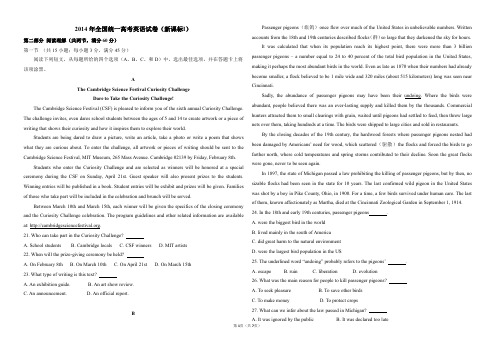
2014年全国统一高考英语试卷(新课标Ⅰ)第二部分阅读理解(共两节,满分60分)第一节(共15小题;每小题3分,满分45分)阅读下列短文,从每题所给的四个选项(A、B、C、和D)中,选出最佳选项,并在答题卡上将该项涂黑。
AThe Cambridge Science Festival Curiosity ChallengeDare to Take the Curiosity Challenge!The Cambridge Science Festival(CSF)is pleased to inform you of the sixth annual Curiosity Challenge. The challenge invites,even dares school students between the ages of5and14to create artwork or a piece of writing that shows their curiosity and how it inspires them to explore their world.Students are being dared to draw a picture,write an article,take a photo or write a poem that shows what they are curious about.To enter the challenge,all artwork or pieces of writing should be sent to the Cambridge Science Festival,MIT Museum,265Mass Avenue.Cambridge02139by Friday,February8th.Students who enter the Curiosity Challenge and are selected as winners will be honored at a special ceremony during the CSF on Sunday,April21st.Guest speaker will also present prizes to the students. Winning entries will be published in a book.Student entries will be exhibit and prizes will be given.Families of those who take part will be included in the celebration and brunch will be served.Between March10th and March15th,each winner will be given the specifics of the closing ceremony and the Curiosity Challenge celebration.The program guidelines and other related information are available at:.21.Who can take part in the Curiosity Challenge?A.School studentsB.Cambridge localsC.CSF winnersD.MIT artists22.When will the prize-giving ceremony be held?A.On February8thB.On March10thC.On April21stD.On March15th23.What type of writing is this text?A.An exhibition guide.B.An art show review.C.An announcement.D.An official report.BPassenger pigeons(旅鸽)once flew over much of the United States in unbelievable numbers.Written accounts from the18th and19th centuries described flocks(群)so large that they darkened the sky for hours.It was calculated that when its population reach its highest point,there were more than3billion passenger pigeons–a number equal to24to40percent of the total bird population in the United States, making it perhaps the most abundant birds in the world.Even as late as1870when their numbers had already become smaller,a flock believed to be1mile wide and320miles(about515kilometers)long was seen near Cincinnati.Sadly,the abundance of passenger pigeons may have been their undoing.Where the birds were abundant,people believed there was an ever-lasting supply and killed them by the mercial hunters attracted them to small clearings with grain,waited until pigeons had settled to feed,then threw large nets over them,taking hundreds at a time.The birds were shipped to large cities and sold in restaurants.By the closing decades of the19th century,the hardwood forests where passenger pigeons nested had been damaged by Americans’need for wood,which scattered(驱散)the flocks and forced the birds to go farther north,where cold temperatures and spring storms contributed to their decline.Soon the great flocks were gone,never to be seen again.In1897,the state of Michigan passed a law prohibiting the killing of passenger pigeons,but by then,no sizable flocks had been seen in the state for10years.The last confirmed wild pigeon in the United States was shot by a boy in Pike County,Ohio,in1900.For a time,a few birds survived under human care.The last of them,known affectionately as Martha,died at the Cincinnati Zoological Garden in September1,1914.24.In the18th and early19th centuries,passenger pigeons.A.were the biggest bird in the worldB.lived mainly in the south of AmericaC.did great harm to the natural environmentD.were the largest bird population in the US25.The underlined word“undoing”probably refers to the pigeons’.A.escapeB.ruinC.liberationD.evolution26.What was the main reason for people to kill passenger pigeons?A.To seek pleasureB.To save other birdsC.To make moneyD.To protect crops27.What can we infer about the law passed in Michigan?A.It was ignored by the publicB.It was declared too lateC.It was unfairD.It was strictCA typical lion tamer(驯兽师)in people’s mind is an entertainer holding a whip(鞭)and a chair.The whip gets all of the attention,but it’s mostly for show.In reality,it’s the chair that does the important work. When a lion tamer holds a chair in front of the lion’s face,the lion tries to focus on all four legs of the chair at the same time.With its focus divided,the lion becomes confused and is unsure about what to do next. When faced with so many options,the lion chooses to freeze and wait instead of attacking the man holding the chair.How often do you find yourself in the same position as the lion?How often do you have something you want to achieve(e.g.lose weight,start a business,travel more)---only to end up confused by all of the options in front of you and never make progress?This upsets me to no end because while all the experts are busy debating about which option is best,the people who want to improve their lives are left confused by all of the conflicting information.The end result is that we feel like we can’t focus or that we’re focused on the wrong things,and so we take less action,make less progress,and stay the same when we could be improving.It doesn’t have to be that way.Anytime you find the world waving a chair in your face,remember this: All you need to do is focus on one thing.You just need to get started.Starting before you feel ready is one of the habits of successful people.If you have somewhere you want to go,something you want to accomplish, someone you want to become…take immediate action.If you’re clear about where you want to go,the rest of the world will either help you get there or get out of the way.28.Why does the lion tamer use a chair?A.To show off his skills.B.To trick the lion.C.To get ready for a fight.D.To entertain the audience.29.In what sense are people similar to a lion facing a chair?A.They feel puzzled over choices.B.They hold on to the wrong things.C.They find it hard to make changed.D.They have to do something for show.30.What is the author’s attitude towards the experts mentioned in Paragraph3?A.TolerantB.DoubtfulC.RespectfulD.Supportive31.When the world is“waving a chair in your face”,you’re advised to.A.wait for a better chanceB.break your old habitsC.make a quick decisionD.ask for clear guidanceDAs more and more people speak the global languages of English,Chinese,Spanish,and Arabic,other languages are rapidly disappearing.In fact,half of the6,000-7,000languages spoken around the world today will likely die out by the next century,according to the United Nations Educational,Scientific,and Cultural Organization(UNESCO).In an effort to prevent language loss,scholars from a number of organizations---UNESCO and National Geographic among them---have for many years been documenting dying languages and the cultures they reflect.Mark Turin,a scientist at the Macmillan Center,Yale University,who specializes in the languages and oral traditions of the Himalayas,is following in that tradition.His recently published book,A Grammar of Thangmi with an Ethnolinguistic Introduction to the Speakers and Their Culture,grows out of his experience living,looking and raising a family in a village in Nepal.Documenting the Tangmi language and culture is just a starting point for Turin,who seeks to include other languages and oral traditions across the Himalayans reaches of India,Nepal,Bhutan,and China.But he is not content to simply record these voices before they disappear without record.At the University of Cambridge Turin discovered a wealth of important materials---including photographs,films,tap recordings,and field notes---which had remained unstudied and were badly in need of care and protection.Now,through the two organizations that he has founded---the Digital Himalaya Project and the World Oral Literature Project---Turin has started a campaign to make such documents,found in libraries and stores around the world,available not just to scholars but to the youngers.Generations of communities from whom the materials were originally collected.Thanks to digital technology and the widely available Internet.Turin notes,the endangered languages can be saved and reconnected with speech communities.32.Many scholars are making efforts to.A.promote global languageB.rescue disappearing languagesC.search for language communitiesD.set up language research organizations33.What does“that tradition”in Paragraph3refer to?A.Having full records of the languages.B.Writing books on language teaching.C.Telling stories about language users.D.Living with the native speakers.34.What is Turin’s book based on?A.The cultural studies in India.B.The documents available at Yale.C.His language research in Bhutan.D.His personal experience in Nepal.35.Which of the following best describes Turin’s work?A.Write,sell and donate.B.Record,repair and reward.C.Design,experiment and report.D.Collect,protect and reconnect.第二节(共5小题,每小题3分,满分15分)根据短文内容,从短文后的选项中选出能填入空白处的最佳选项,选项中有两项为多余选项。
2014北京高考英语试题及答案
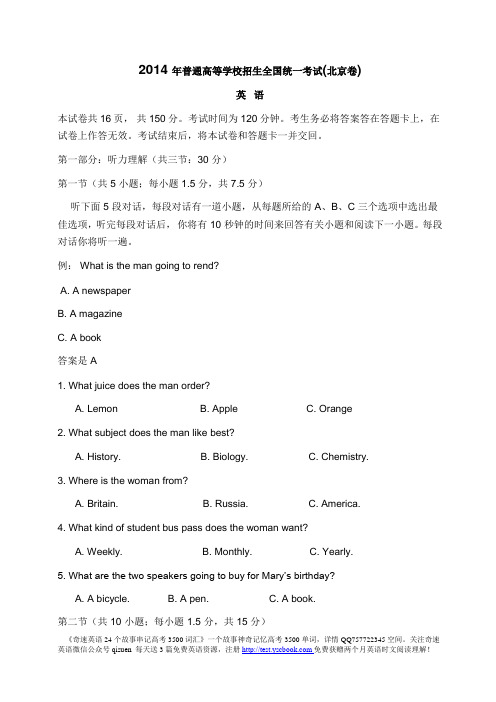
2014 年普通高等学校招生全国统一考试(北京卷)英语本试卷共16页,共150分。
考试时间为120分钟。
考生务必将答案答在答题卡上,在试卷上作答无效。
考试结束后,将本试卷和答题卡一并交回。
第一部分:听力理解(共三节:30 分)第一节(共 5 小题;每小题 1.5 分,共 7.5 分)听下面 5 段对话,每段对话有一道小题,从每题所给的 A、B、C 三个选项中选出最佳选项,听完每段对话后,你将有 10 秒钟的时间来回答有关小题和阅读下一小题。
每段对话你将听一遍。
例: What is the man going to rend?A. A newspaperB. A magazineC. A book答案是 A1. What juice does the man order?A. LemonB. AppleC. Orange2. What subject does the man like best?A. History.B. Biology.C. Chemistry.3. Where is the woman from?A. Britain.B. Russia.C. America.4. What kind of student bus pass does the woman want?A. Weekly.B. Monthly.C. Yearly.5. What are the two speakers going to buy for Mary’s birthday?A. A bicycle.B. A pen.C. A book.第二节(共 10 小题;每小题 1.5 分,共 15 分)听下面 4 段对话或独白。
每段对话或独白后有几道小题,从每题所给的 A、B、C 三个选项中选出最佳选项。
听每段对话或独白前,你将有 5 秒钟的时间阅读每小题。
听完后,每小题将给出 5 秒钟的作答时间。
每段对话或独白你将听两遍。
2014高考新课标1全国卷英语试题和答案解析
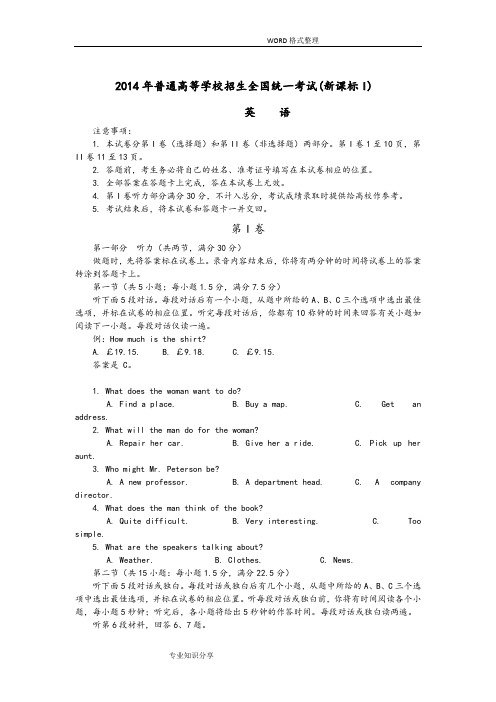
2014年普通高等学校招生全国统一考试(新课标I)英语注意事项:1. 本试卷分第I卷(选择题)和第II卷(非选择题)两部分。
第I卷1至10页,第II卷11至13页。
2. 答题前,考生务必将自己的姓名、准考证号填写在本试卷相应的位置。
3. 全部答案在答题卡上完成,答在本试卷上无效。
4. 第I卷听力部分满分30分,不计入总分,考试成绩录取时提供给高校作参考。
5. 考试结束后,将本试卷和答题卡一并交回。
第I卷第一部分听力(共两节,满分30分)做题时,先将答案标在试卷上。
录音内容结束后,你将有两分钟的时间将试卷上的答案转涂到答题卡上。
第一节(共5小题;每小题1.5分,满分7.5分)听下面5段对话。
每段对话后有一个小题,从题中所给的A、B、C三个选项中选出最佳选项,并标在试卷的相应位置。
听完每段对话后,你都有10称钟的时间来回答有关小题如阅读下一小题。
每段对话仅读一遍。
例:How much is the shirt?A. £19.15.B. £9.18.C. £9.15.答案是 C。
1. What does the woman want to do?A. Find a place.B. Buy a map.C. Get an address.2. What will the man do for the woman?A. Repair her car.B. Give her a ride.C. Pick up her aunt.3. Who might Mr. Peterson be?A. A new professor.B. A department head.C. A company director.4. What does the man think of the book?A. Quite difficult.B. Very interesting.C. Too simple.5. What are the speakers talking about?A. Weather.B. Clothes.C. News.第二节(共15小题:每小题1.5分,满分22.5分)听下面5段对话或独白。
2014年高考全国卷英语完形填空试题
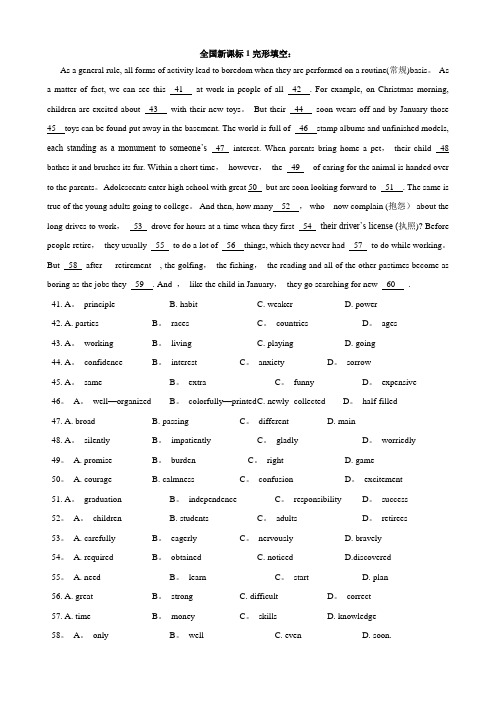
全国新课标1完形填空:As a general rule, all forms of activity lead to boredom when they are performed on a routine(常规)basis。
As a matter of fact, we can see this 41 at work in people of all 42 . For example, on Christmas morning, children are excited about 43 with their new toys。
But their 44 soon wears off and by January those 45 toys can be found put away in the basement. The world is full of 46 stamp albums and unfinished models, each standing as a monument to someone’s 47 interest. When parents bring home a pet,their child 48 bathes it and brushes its fur. Within a short time,however,the 49 of caring for the animal is handed over to the parents。
Adolescents enter high school with great 50 but are soon looking forward to 51 . The same is true of the young adults going to college。
And then, how many 52 ,who now complain (抱怨)about the long drives to work,53 drove for hours at a time when they first 54 their driver’s license (执照)? Before people retire,they usually 55 to do a lot of 56 things, which they never had 57 to do while working。
2014全国卷新课标1高考英语试题及答案解析(可打印版)
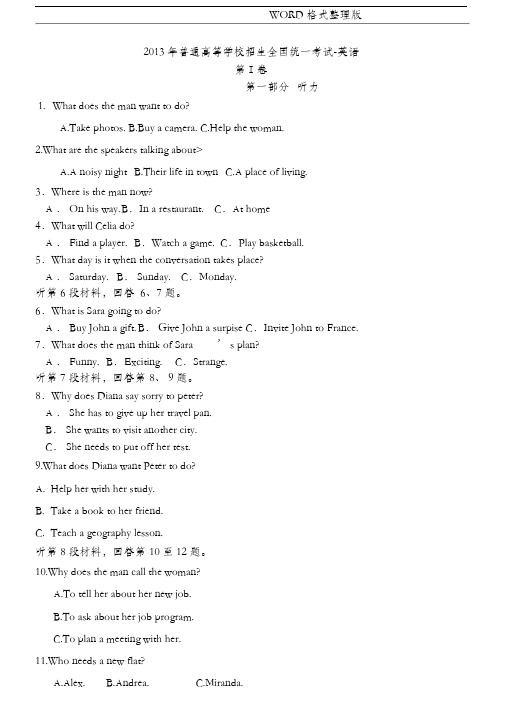
....WORD 格式整理版2013 年普通高等学校招生全国统一考试-英语第Ⅰ卷第一部分听力1. What does the man want to do?A.Take photos.B.Buy a camera.C.Help the woman.2.What are the speakers talking about>A.A noisy nightB.Their life in townC.A place of living. 3.Where is the man now?A . On his way. B.In a restaurant. C.At home4.What will Celia do?A . Find a player. B.Watch a game. C.Play basketball. 5.What day is it when the conversation takes place?A . Saturday. B. Sunday. C.Monday.听第 6 段材料,回答 6、7 题。
6.What is Sara going to do?A . Buy John a gift. B. Give John a surpise C.Invite John to France. 7.What does the man think of Sara ’ s plan?A . Funny. B.Exciting. C.Strange.听第 7 段材料,回答第 8、 9 题。
8.Why does Diana say sorry to peter?A . She has to give up her travel pan.B. She wants to visit another city.C. She needs to put off her test.9.What does Diana want Peter to do?A.Help her with her study.B.Take a book to her friend.C.Teach a geography lesson.听第 8 段材料,回答第 10 至 12 题。
2014年全国高考英语试题及答案-辽宁卷

2014普通高等学校招生全国统一考试(辽宁卷)英语注意事项:1.本试卷分第卷和第卷两部分。
答卷前,考试务必将自己的姓名、准考证号填写在答题卡上。
2.作答时,将答案写在答题卡上。
写在本试卷上无效。
3.考试结束后,将本试卷和卡题卡一并交回。
第二部分阅读理解(共两节,满分40分)第一节(共15小题;每小题2分,满分30分)阅读下列短文,从每题所给的四个选项(A, B, C和D)中.选出最佳选项,并在答题卡上将该项涂黑。
AA new study shows students who write notes by hand during lectures perform better on exams than those who use laptops(笔记本电脑).Students arc increasingly using laptops for note-taking because of speed and legibility(清晰度).But the research has found laptop users are less able to remember and apply the concepts they have been taught.Researchers performed experiments that aimed to find out whether using a laptop increased the tendency to make notes "mindlessly" by taking down word for word what the professors said In the first experiment, students were given either a laptop or pen and paper .They listened to the same lectures and were told to use their usual note-taking skills. Thirty minutes after the talk , they were examined on their ability to remember facts and on how well they understood concepts.The researchers found that laptop users took twice as many notes as those who wrote by hand. However, the typists performed worse at remembering and applying the concepts. Both groups scored similarly when it came to memorizing facts.The researchers' report said, "While more notes are beneficial, if the notes are taken mindlessly, as is more likely the case on a laptop, the benefit disappears."In another experiment aimed at testing long-term memory, students took notes as before but were tested aweek after the lecture. This time, the students who wrote notes by hand performed significantly better on the exam.These two experiments suggest that handwritten notes are not only better for immediate learning and understanding, but that they also lead to superior revision in the future.21. More and more students favor laptops for note-taking because they can . .A. write more notesB. digest concepts betterC. get higher scoresD. understand lectures better22. While taking notes, laptop users tend to be . .A. skillfulB. mindlessC. thoughtfulD. tireless23. The author of the passage aims to . .A. examine the importance of long-term memoryB. stress the benefit of taking notes by handC. explain the process of taking notesD. promote the use of laptops24. The passage is likely to appear in . .A. a newspaper advertisementB. a computer textbookC. a science magazineD. a finance reportB(Q = Question; A = Answer)Situation IQ: If someone sits right next to me in an empty movie theater, is it rude to move?A: Maybe, but nobody will fault you for it. Chances are that close sitter doesn't realize he disturbs you, so he maymiss your annoyance. You undoubtedly aren't the first person he's met who needs enough room. Forgive hisbad judgment, move quietly and enjoy the show.Situation IIQ: If I use the bathroom at a store, do I need to buy something?A: Consider frequency and urgency. Is this a one-time or an emergency? If so, you don't have to buy anything, butit would be kind if you did. However, if you regularly use the bathroom at this place, then you are acustomer,and you should act like one.Situation IIIQ: If someone is talking loudly on the bus, is there a nice way to ask him to keep it down?A: No. Try other means.1) Stare at him until he gets aware of it and quiets down. 2) Lift your finger in a silencemotion(动作)and smile. 3) Put on earphones and ignore him.Situation IVQ: If I remember my friend's birthday a day late, should I apologize or just wish her a happy birthday like nothinghappened?A: This is the reason why the word belated was invented. "Happy belated birthday!" is short for: "Well, I know Iforgot, but then I remembered. Forgive me and happy birthday."Situation VQ: Can I lie about seeing a text because I was too busy or lazy to respond(回复) to it?A: Don't lie. Receiving a text does not mean you need to respond to it. Why waste a perfectly good lie when thetruth will serve? "Yes," you can say if ever asked, "I saw it." No explanation is needed as to why you don'trespond.25. You will get annoyed in a theater when . .A. a person is too activeB. a person is too rude to youC. a person talks too loudlyD. a person sits too close to you26. How will you quiet someone down in a public place?A. By making fun of him continuously.B. By looking purposefully at him.C. By talking to him directly.D. By pointing angrily at him.27. The underlined word "belated" in Situation IV probably means ..A. predictedB. returnedC. cancelledD. delayed28. What is the passage mainly about?A. Modern ways to mind your manners.B. Different ways to change others' manners.C. Proper manners to offer help to others.D. Good manners to talk to people.CWould it surprise you to learn that, like animals, trees communicate with each other and pass on their wealth to the next generation?UBC Professor Simard explains how trees are much more complex than most of us ever imagined. Although Charles Darwin thought that trees are competing for survival of the fittest, Simard shows just how wrong he was. In fact, the opposite is true: trees survive through their co-operation and support, passing around necessary nutrition "depending on who needs it".Nitrogen (氮) and carbon are shared through miles of underground fungi (真菌) networks, making sure that all trees in the forest ecological system give and receive just the right amount to keep them all healthy. This hidden system works in a very similar way to the networks of neurons (神经元) in our brains, and when one tree is destroyed, it affects all.Simard talks about "mother trees", usually the largest and oldest plants on which all other trees depend. She explains how dying trees pass on the wealth to the next generation, transporting important minerals to young trees so they may continue to grow. When humans cut down "mother trees" with no awareness of these highly complex "tree societies" or the networks on which they feed, we are reducing the chances of survival for the entire forest."We didn't take any notice of it" Simard says sadly. "Dying trees move nutrition into the young trees before dying, but we never give them chance." If we could put across the message to the forestry industry, we could make a huge difference towards our environmental protection efforts for the future.29. The underlined sentence "the opposite is true" in Paragraph 2 probably means that trees .A. compete for survivalB. protect their own wealthC. depend on each otherD. provide support for dying trees30. "Mother trees" are extremely important because they .A. look the largest in size in the forestB. pass on nutrition to young treesC. seem more likely to be cut down by humansD. know more about the complex "tree societies"31. The underlined word "it" in the last paragraph refers to .A. how "tree societies" workB. how trees grow oldC. how forestry industry developsD. how young trees survive32. What would be the best title for the passage?A. Old Trees Communicate Like HumansB. Young Trees Are In Need Of ProtectionC. Trees Are More Awesome Than You ThinkD. Trees Contribute To Our SocietyDTravis is the manager of G&G where he is responsible for forty employees (雇员)and profits (利润) of over $2 million per year. He's never late to work. He does not get upset on the job. When one of his employees started crying after a customer screamed at her, Travis took her away. "Your working uniform is your shelter," he told her. "Nothing anyone says will ever hurt you. You will always be as strong as you want to be."Travis picked up that lecture in one of his G&G training courses, an education program that began on his first day and continues throughout an employee's occupation. The training has, Travis says, changed his life. G&G has taught him how to live, how to focus, how to get to work on time, and how to master his emotions (情绪). Most importantly, it taught him willpower.At the center of that education is an extreme focus on an all-important habit; willpower. Dozens of cases show that willpower is the single most important habit for a person's success.And the best way to strengthen willpower is to make it into a habit. "Sometimes it looks like people with great self-control aren't working hard—but that's because they've made it automatic," Angela Duckworth, one of the University of Pennsylvaniaresearchers said. "Their willpower occurs without them having to think about it."The company spent millions of dollars developing programs of study to trainemployees on self-control. Managers wrote workbooks that serve as guides to how to make willpower a habit in workers' lives. Those courses arc, in part, why G&G has grown from a sleepy company into a largeone with more than seventeen thousand stores and profits of more than $10 billion a year.33. We loam from Paragraph 2 that employees in G&G must .A. learn to give lecturesB. attend education programsC. design a working uniformD. develop a common hobby34. Willpower will become a habit when employees can .A. focus on the profitsB. benefit from the jobC. protect themselves wellD. control their feeling well35. What can we infer from the passage?A. G&G has grown into a large company.B. G&G will spend half its profits training employees.C. G&G may become more successful in the future.D. G&G has to produce more workbooks for managers.第二节(共5小题;每小题2分, 满分10分)根据短文内容,从短文后的选项中选出能填入空白处的最佳选项,并在答题卡上将该项涂黑。
2014年普通高等学校招生全国统一考试全国1卷英语试题与参考答案
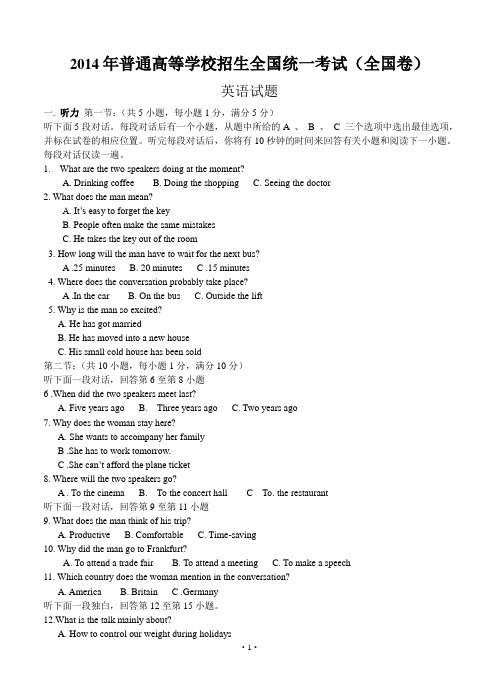
2014年普通高等学校招生全国统一考试(全国卷)英语试题一. 听力第一节:(共5小题,每小题1分,满分5分)听下面5段对话。
每段对话后有一个小题,从题中所给的A 、B 、C 三个选项中选出最佳选项,并标在试卷的相应位置。
听完每段对话后,你将有10秒钟的时间来回答有关小题和阅读下一小题。
每段对话仅读一遍。
1.What are the two speakers doing at the moment?A. Drinking coffeeB. Doing the shoppingC. Seeing the doctor2. What does the man mean?A. It‟s easy to forget the keyB. People often make the same mistakesC. He takes the key out of the room3. How long will the man have to wait for the next bus?A .25 minutes B. 20 minutes C .15 minutes4. Where does the conversation probably take place?A .In the car B. On the bus C. Outside the lift5. Why is the man so excited?A. He has got marriedB. He has moved into a new houseC. His small cold house has been sold第二节:(共10小题,每小题1分,满分10分)听下面一段对话,回答第6至第8小题6 .When did the two speakers meet last?A. Five years agoB. Three years agoC. Two years ago7. Why does the woman stay here?A. She wants to accompany her familyB .She has to work tomorrow.C .She c an‟t afford the plane ticket8. Where will the two speakers go?A . To the cinema B. To the concert hall C To. the restaurant听下面一段对话,回答第9至第11小题9. What does the man think of his trip?A. ProductiveB. ComfortableC. Time-saving10. Why did the man go to Frankfurt?A. To attend a trade fairB. To attend a meetingC. To make a speech11. Which country does the woman mention in the conversation?A. AmericaB. Britain C .Germany听下面一段独白,回答第12至第15小题。
2014高考新课标1全国卷英语试题和答案解析

2014年普通高等学校招生全国统一考试(新课标I)英语注意事项:1. 本试卷分第I卷(选择题)和第II卷(非选择题)两部分。
第I卷1至10页,第II 卷11至13页。
2. 答题前,考生务必将自己的姓名、准考证号填写在本试卷相应的位置。
3. 全部答案在答题卡上完成,答在本试卷上无效。
4. 第I卷听力部分满分30分,不计入总分,考试成绩录取时提供给高校作参考。
5. 考试结束后,将本试卷和答题卡一并交回。
第I卷第一部分听力(共两节,满分30分)做题时,先将答案标在试卷上。
录音内容结束后,你将有两分钟的时间将试卷上的答案转涂到答题卡上。
第一节(共5小题;每小题1.5分,满分7.5分)听下面5段对话。
每段对话后有一个小题,从题中所给的A、B、C三个选项中选出最佳选项,并标在试卷的相应位置。
听完每段对话后,你都有10称钟的时间来回答有关小题如阅读下一小题。
每段对话仅读一遍。
例:How much is the shirt?A. £19.15.B. £9.18.C. £9.15.答案是C。
1. What does the woman want to do?A. Find a place.B. Buy a map.C. Get an address.2. What will the man do for the woman?A. Repair her car.B. Give her a ride.C. Pick up her aunt.3. Who might Mr. Peterson be?A. A new professor.B. A department head.C. A company director.4. What does the man think of the book?A. Quite difficult.B. Very interesting.C. Too simple.5. What are the speakers talking about?A. Weather.B. Clothes.C. News.第二节(共15小题:每小题1.5分,满分22.5分)听下面5段对话或独白。
2014年高考英语试题全国卷1
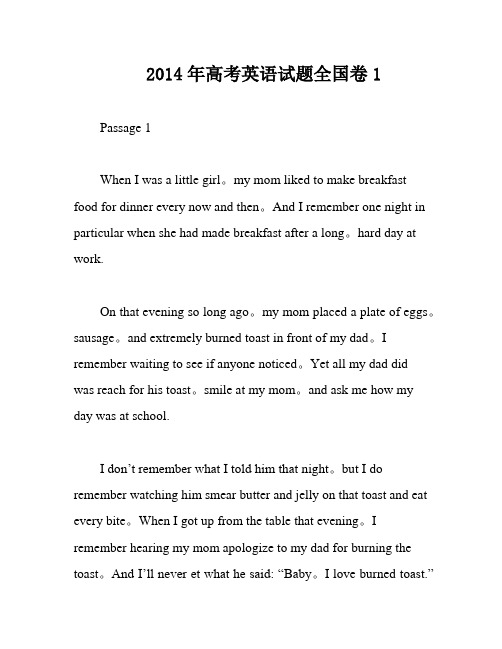
2014年高考英语试题全国卷1Passage 1When I was a little girl。
my mom liked to make breakfast food for dinner every now and then。
And I remember one night in particular when she had made breakfast after a long。
hard day at work.On that evening so long ago。
my mom placed a plate of eggs。
sausage。
and extremely burned toast in front of my dad。
I remember waiting to see if anyone noticed。
Yet all my dad didwas reach for his toast。
smile at my mom。
and ask me how my day was at school.I don’t remember what I told him that night。
but I do remember watching him smear butter and jelly on that toast and eat every bite。
When I got up from the table that evening。
I remember hearing my mom apologize to my dad for burning the toast。
And I’ll never et what he said: “Baby。
I love burned t oast.”Later that night。
I went to kiss Daddy good night and I asked him if he really liked his toast burned。
2014高考英语真题试卷全国一卷(含答案和解析)

2014年全国统一高考英语试卷(新课标Ⅰ)第二部分阅读理解(共两节,满分60分)第一节(共15小题;每小题3分,满分45分)阅读下列短文,从每题所给的四个选项(A、B、C、和D)中,选出最佳选项,并在答题卡上将该项涂黑。
AThe Cambridge Science Festival Curiosity ChallengeDare to Take the Curiosity Challenge!The Cambridge Science Festival(CSF)is pleased to inform you of the sixth annual Curiosity Challenge. The challenge invites,even dares school students between the ages of5and14to create artwork or a piece of writing that shows their curiosity and how it inspires them to explore their world.Students are being dared to draw a picture,write an article,take a photo or write a poem that shows what they are curious about.To enter the challenge,all artwork or pieces of writing should be sent to the Cambridge Science Festival,MIT Museum,265Mass Avenue.Cambridge02139by Friday,February8th.Students who enter the Curiosity Challenge and are selected as winners will be honored at a special ceremony during the CSF on Sunday,April21st.Guest speaker will also present prizes to the students. Winning entries will be published in a book.Student entries will be exhibit and prizes will be given.Families of those who take part will be included in the celebration and brunch will be served.Between March10th and March15th,each winner will be given the specifics of the closing ceremony and the Curiosity Challenge celebration.The program guidelines and other related information are available at:.21.Who can take part in the Curiosity Challenge?A.School studentsB.Cambridge localsC.CSF winnersD.MIT artists22.When will the prize-giving ceremony be held?A.On February8thB.On March10thC.On April21stD.On March15th23.What type of writing is this text?A.An exhibition guide.B.An art show review.C.An announcement.D.An official report.BPassenger pigeons(旅鸽)once flew over much of the United States in unbelievable numbers.Written accounts from the18th and19th centuries described flocks(群)so large that they darkened the sky for hours.It was calculated that when its population reach its highest point,there were more than3billion passenger pigeons–a number equal to24to40percent of the total bird population in the United States, making it perhaps the most abundant birds in the world.Even as late as1870when their numbers had already become smaller,a flock believed to be1mile wide and320miles(about515kilometers)long was seen near Cincinnati.Sadly,the abundance of passenger pigeons may have been their undoing.Where the birds were abundant,people believed there was an ever-lasting supply and killed them by the mercial hunters attracted them to small clearings with grain,waited until pigeons had settled to feed,then threw large nets over them,taking hundreds at a time.The birds were shipped to large cities and sold in restaurants.By the closing decades of the19th century,the hardwood forests where passenger pigeons nested had been damaged by Americans’need for wood,which scattered(驱散)the flocks and forced the birds to go farther north,where cold temperatures and spring storms contributed to their decline.Soon the great flocks were gone,never to be seen again.In1897,the state of Michigan passed a law prohibiting the killing of passenger pigeons,but by then,no sizable flocks had been seen in the state for10years.The last confirmed wild pigeon in the United States was shot by a boy in Pike County,Ohio,in1900.For a time,a few birds survived under human care.The last of them,known affectionately as Martha,died at the Cincinnati Zoological Garden in September1,1914.24.In the18th and early19th centuries,passenger pigeons.A.were the biggest bird in the worldB.lived mainly in the south of AmericaC.did great harm to the natural environmentD.were the largest bird population in the US25.The underlined word“undoing”probably refers to the pigeons’.A.escapeB.ruinC.liberationD.evolution26.What was the main reason for people to kill passenger pigeons?A.To seek pleasureB.To save other birdsC.To make moneyD.To protect crops27.What can we infer about the law passed in Michigan?A.It was ignored by the publicB.It was declared too lateC.It was unfairD.It was strictCA typical lion tamer(驯兽师)in people’s mind is an entertainer holding a whip(鞭)and a chair.The whip gets all of the attention,but it’s mostly for show.In reality,it’s the chair that does the important work. When a lion tamer holds a chair in front of the lion’s face,the lion tries to focus on all four legs of the chair at the same time.With its focus divided,the lion becomes confused and is unsure about what to do next. When faced with so many options,the lion chooses to freeze and wait instead of attacking the man holding the chair.How often do you find yourself in the same position as the lion?How often do you have something you want to achieve(e.g.lose weight,start a business,travel more)---only to end up confused by all of the options in front of you and never make progress?This upsets me to no end because while all the experts are busy debating about which option is best,the people who want to improve their lives are left confused by all of the conflicting information.The end result is that we feel like we can’t focus or that we’re focused on the wrong things,and so we take less action,make less progress,and stay the same when we could be improving.It doesn’t have to be that way.Anytime you find the world waving a chair in your face,remember this: All you need to do is focus on one thing.You just need to get started.Starting before you feel ready is one of the habits of successful people.If you have somewhere you want to go,something you want to accomplish, someone you want to become…take immediate action.If you’re clear about where you want to go,the rest of the world will either help you get there or get out of the way.28.Why does the lion tamer use a chair?A.To show off his skills.B.To trick the lion.C.To get ready for a fight.D.To entertain the audience.29.In what sense are people similar to a lion facing a chair?A.They feel puzzled over choices.B.They hold on to the wrong things.C.They find it hard to make changed.D.They have to do something for show.30.What is the author’s attitude towards the experts mentioned in Paragraph3?A.TolerantB.DoubtfulC.RespectfulD.Supportive31.When the world is“waving a chair in your face”,you’re advised to.A.wait for a better chanceB.break your old habitsC.make a quick decisionD.ask for clear guidanceDAs more and more people speak the global languages of English,Chinese,Spanish,and Arabic,other languages are rapidly disappearing.In fact,half of the6,000-7,000languages spoken around the world today will likely die out by the next century,according to the United Nations Educational,Scientific,and Cultural Organization(UNESCO).In an effort to prevent language loss,scholars from a number of organizations---UNESCO and National Geographic among them---have for many years been documenting dying languages and the cultures they reflect.Mark Turin,a scientist at the Macmillan Center,Yale University,who specializes in the languages and oral traditions of the Himalayas,is following in that tradition.His recently published book,A Grammar of Thangmi with an Ethnolinguistic Introduction to the Speakers and Their Culture,grows out of his experience living,looking and raising a family in a village in Nepal.Documenting the Tangmi language and culture is just a starting point for Turin,who seeks to include other languages and oral traditions across the Himalayans reaches of India,Nepal,Bhutan,and China.But he is not content to simply record these voices before they disappear without record.At the University of Cambridge Turin discovered a wealth of important materials---including photographs,films,tap recordings,and field notes---which had remained unstudied and were badly in need of care and protection.Now,through the two organizations that he has founded---the Digital Himalaya Project and the World Oral Literature Project---Turin has started a campaign to make such documents,found in libraries and stores around the world,available not just to scholars but to the youngers.Generations of communities from whom the materials were originally collected.Thanks to digital technology and the widely available Internet.Turin notes,the endangered languages can be saved and reconnected with speech communities.32.Many scholars are making efforts to.A.promote global languageB.rescue disappearing languagesC.search for language communitiesD.set up language research organizations33.What does“that tradition”in Paragraph3refer to?A.Having full records of the languages.B.Writing books on language teaching.C.Telling stories about language users.D.Living with the native speakers.34.What is Turin’s book based on?A.The cultural studies in India.B.The documents available at Yale.C.His language research in Bhutan.D.His personal experience in Nepal.35.Which of the following best describes Turin’s work?A.Write,sell and donate.B.Record,repair and reward.C.Design,experiment and report.D.Collect,protect and reconnect.第二节(共5小题,每小题3分,满分15分)根据短文内容,从短文后的选项中选出能填入空白处的最佳选项,选项中有两项为多余选项。
2014年浙江省高考英语试卷及答案(全国统一考试)
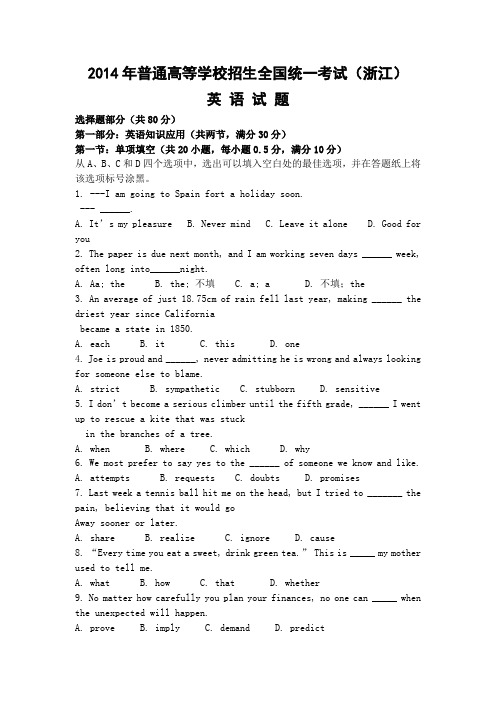
2014年普通高等学校招生全国统一考试(浙江)英语试题选择题部分(共80分)第一部分:英语知识应用(共两节,满分30分)第一节:单项填空(共20小题,每小题0.5分,满分10分)从A、B、C和D四个选项中,选出可以填入空白处的最佳选项,并在答题纸上将该选项标号涂黑。
1. ---I am going to Spain fort a holiday soon.--- ______.A. It’s my pleasureB. Never mindC. Leave it aloneD. Good for you2. The paper is due next month, and I am working seven days ______ week, often long into______night.A. Aa; theB. the; 不填C. a; aD. 不填;the3. An average of just 18.75cm of rain fell last year, making ______ the driest year since Californiabecame a state in 1850.A. eachB. itC. thisD. one4. Joe is proud and ______, never admitting he is wrong and always looking for someone else to blame.A. strictB. sympatheticC. stubbornD. sensitive5. I don’t become a serious climber until the fifth grade, ______ I went up to rescue a kite that was stuckin the branches of a tree.A. whenB. whereC. whichD. why6. We most prefer to say yes to the ______ of someone we know and like.A. attemptsB. requestsC. doubtsD. promises7. Last week a tennis ball hit me on the head, but I tried to _______ the pain, believing that it would goAway sooner or later.A. shareB. realizeC. ignoreD. cause8. “Every time you eat a sweet, drink green tea.”This is _____ my mother used to tell me.A. whatB. howC. thatD. whether9. No matter how carefully you plan your finances, no one can _____ when the unexpected will happen.A. proveB. implyC. demandD. predict10. While staying in the village, James unselfishly shared whatever he had with the villagers withoutAsking for anything ______ .A. in returnB. in commonC. in turnD. in place11. Sofia looked around at all the faces: she had the impression that she _____ most of the guests before.A. has seenB. had seenC. sawD. would see12. Facing up to your problem ____ running away from them is the best approach to working things out.A. more thanB. rather thanC. along withD.or rather13. The aim of education is to teach young people to think for themselves and not follow others ______ .A. blindlyB. unwillinglyC. closelyD. carefully14. Annie Salmon, disabled, is attended throughout her school days by a nurse _______ to guard her.A. to appointB. appointingC. appointedD. having appointed15. Cathy had quit her job when her son was born _______ she could stay home and raise her family.A.now thatB. as ifC. only ifD. so that16. They were abroad during the months when we were carrying out the investigation, or they _____ toour help.A. would have comeB. could comeC. have comeD. had come17. People won’t pay attention to you when they still have a lot of ideas of their own crying _______expression.A. fromB. overC. withD. for18. There’s no reason to be disappointed. ______, this could be rather amusing.A. Above allB. As a resultC. In additionD. As a matter of fact19. How could you ______ such a fantastic job when you have been out of work for months.A. turn offB. turn inC.turn downD. turn to20. —I’d like a wake-up call at 7:00 a.m., please!—OK, _______.A. help yourselfB. You will certainly make itC. just do what you likeD. I’ll make sure you get one第二节:完形填空(共20小题;每小题1分,满分20分)阅读下面短文,掌握其大意,然后从21—40各题所给的四个选项中(A、B、C 和D)中,选出最佳选项,并在答题纸上将该选项标号涂黑。
2014年高考新课标I全国卷英语试题与答案
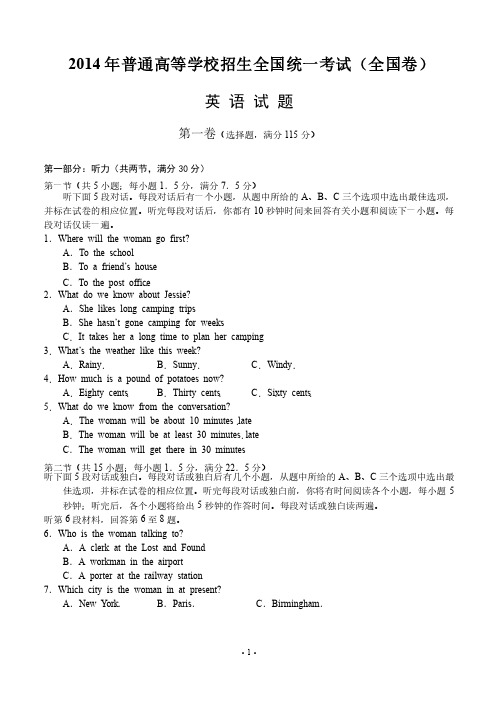
2014年普通高等学校招生全国统一考试(全国卷)英语试题第一卷(选择题,满分115分)分)第一部分:听力(共两节,满分30分)分)第一节(共5小题;每小题1.5分,满分7.5分)听下面5段对话。
每段对话后有一个小题,从题中所给的A、B、C三个选项中选出最佳选项,并标在试卷的相应位置。
听完每段对话后,你都有10秒钟时间来回答有关小题和阅读下一小题。
每段对话仅读一遍。
段对话仅读一遍。
1.Where will the woman go first? A.To the school B.T o a friend’s house.C.To the post office.2.What do we know about Jessie? A.She likes long camping trips.B.She hasn’t gone camping for weeks.C.It takes her a long time to plan her camping.3.What’s the weather like this week?A.Rainy.B.Sunny.C.Windy.4.How much is a pound of potatoes now? A.Eighty cents.B.Thirty cents.C.Sixty cents.5.What do we know from the conversation? A.The woman will be about 10 minutes late.B.The woman will be at least 30 minutes late.C.The woman will get there in 30 minutes.分)第二节(共15小题;每小题1.5分,满分22.5分)听下面5段对话或独白。
每段对话或独白后有几个小题,从题中所给的A、B、C三个选项中选出最佳选项,并标在试卷的相应位置。
2014全国卷新课标1高考英语试题及答案解析(可打印版)
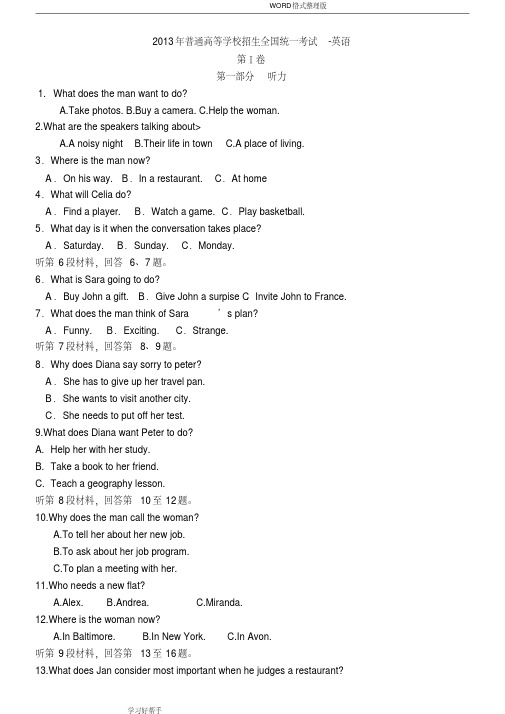
2013年普通高等学校招生全国统一考试-英语第Ⅰ卷第一部分听力1.What does the man want to do?A.Take photos.B.Buy a camera.C.Help the woman.2.What are the speakers talking about>A.A noisy nightB.Their life in townC.A place of living. 3.Where is the man now?A.On his way. B.In a restaurant. C.At home4.What will Celia do?A.Find a player. B.Watch a game. C.Play basketball. 5.What day is it when the conversation takes place?A.Saturday. B.Sunday. C.Monday.听第6段材料,回答6、7题。
6.What is Sara going to do?A.Buy John a gift. B.Give John a surpise C.Invite John to France. 7.What does the man think of Sara’s plan?A.Funny. B.Exciting. C.Strange.听第7段材料,回答第8、9题。
8.Why does Diana say sorry to peter?A.She has to give up her travel pan.B.She wants to visit another city.C.She needs to put off her test.9.What does Diana want Peter to do?A.Help her with her study.B.Take a book to her friend.C.Teach a geography lesson.听第8段材料,回答第10至12题。
2014年高考英语湖南卷(完整试题+答案+解析)
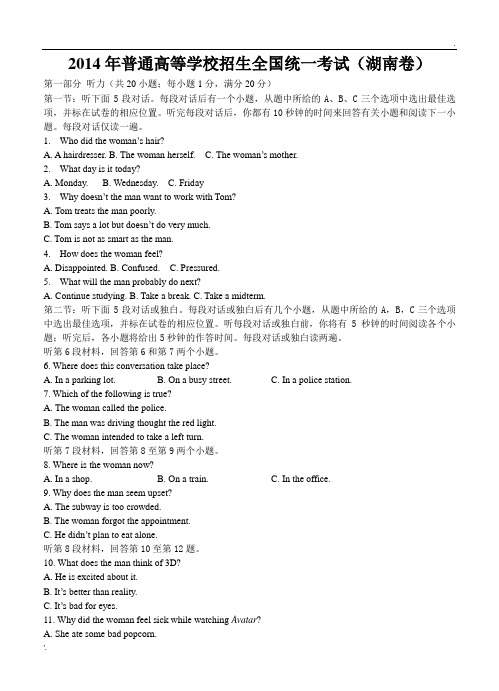
2014年普通高等学校招生全国统一考试(湖南卷)第一部分听力(共20小题;每小题1分,满分20分)第一节:听下面5段对话。
每段对话后有一个小题,从题中所给的A、B、C三个选项中选出最佳选项,并标在试卷的相应位置。
听完每段对话后,你都有10秒钟的时间来回答有关小题和阅读下一小题。
每段对话仅读一遍。
1.Who did the woman’s hair?A. A hairdresser.B. The woman herself.C. The woman’s mother.2.What day is it today?A. Monday.B. Wednesday.C. Friday3.Why doesn’t the man want to work with Tom?A. Tom treats the man poorly.B. Tom says a lot but doesn’t do very much.C. Tom is not as smart as the man.4.How does the woman feel?A. Disappointed.B. Confused.C. Pressured.5.What will the man probably do next?A. Continue studying.B. Take a break.C. Take a midterm.第二节:听下面5段对话或独白。
每段对话或独白后有几个小题,从题中所给的A,B,C三个选项中选出最佳选项,并标在试卷的相应位置。
听每段对话或独白前,你将有5秒钟的时间阅读各个小题;听完后,各小题将给出5秒钟的作答时间。
每段对话或独白读两遍。
听第6段材料,回答第6和第7两个小题。
6. Where does this conversation take place?A. In a parking lot.B. On a busy street.C. In a police station.7. Which of the following is true?A. The woman called the police.B. The man was driving thought the red light.C. The woman intended to take a left turn.听第7段材料,回答第8至第9两个小题。
(完整版)2014年全国卷1 英语试卷以及答案

2014年普通高等学校招生全国统一考试(新课标I)英语第I卷第一部分听力(共两节,满分30分)做题时,先将答案标在试卷上。
录音内容结束后,你将有两分钟的时间将试卷上的答案转涂到答题卡上。
第一节(共5小题;每小题1.5分,满分7。
5分)听下面5段对话。
每段对话后有一个小题,从题中所给的A、B、C三个选项中选出最佳选项,并标在试卷的相应位置。
听完每段对话后,你都有10称钟的时间来回答有关小题如阅读下一小题。
每段对话仅读一遍。
1。
What does the woman want to do?A. Find a place。
B。
Buy a map. C. Get an address。
2. What will the man do for the woman?A。
Repair her car。
B. Give her a ride。
C。
Pick up her aunt。
3. Who might Mr. Peterson be?A。
A new professor。
B. A department head. C。
A company director.4。
What does the man think of the book?A。
Quite difficult。
B。
Very interesting。
C. Too simple.5。
What are the speakers talking about?A。
Weather. B. Clothes. C。
News.第二节(共15小题;每小题1.5分,满分22.5分)听下面5段对话或独白。
每段对话或独白后有几个小题,从题中所给的A、B、C三个选项中选出最佳选项,并标在试卷的相应位置。
听每段对话或独白前,你将有时间阅读各个小题,每小题5秒钟;听完后,各小题将给出5秒钟的作答时间。
每段对话或独白读两遍.听第6段材料,回答第6至7题。
6. Why is Harry unwilling to join the woman?A. He has a pain in his knee。
2014年浙江省英语高考试题及答案全国卷word版

2014年浙江省英语高考试题及答案全国卷第一部分:英语知识应用(共两节,满分30分)第一节:单项填空(共20小题,每小题0.5分,满分10分)从A、B、C和D四个选项中,选出可以填入空白处的最佳选项,并在答题纸上将该选项标号涂黑。
1. ---I am going to Spain fort a holiday soon.--- ______.A. It’s my pleasureB. Never mindC. Leave it aloneD. Good for you2. The paper is due next month, and I am working seven days ______ week, often long into______night.A. Aa; theB. the; 不填C. a; aD. 不填;the3.An average of just 18.75cm of rain fell last year, making ______ the driest year since Californiabecame a state in 1850.A. eachB. itC. thisD. one4.Joe is proud and ______, never admitting he is wrong and always looking for someone else to blame.A. strictB. sympatheticC. stubbornD. sensitive5.I don’t become a serious climber until the fifth grade, ______ I went up to rescue a kite that was stuckin the branches of a tree.A. whenB. whereC. whichD. why6.We most prefer to say yes to the ______ of someone we know and like.A. attemptsB. requestsC. doubtsD. promisesst week a tennis ball hit me on the head, but I tried to _______ the pain, believing that it would goaway sooner or later.A. shareB. realizeC. ignoreD. cause8.“Every time you eat a sweet, drink green tea.” This is _____ my mother used to tell me.A. whatB. howC. thatD. whether9.No matter how carefully you plan your finances, no one can _____ when the unexpected will happen.A. proveB. implyC. demandD. predict10.While staying in the village, James unselfishly shared whatever he had with the villagers withoutasking for anything ______ .A. in returnB. in commonC. in turnD. in place11.Sofia looked around at all the faces: she had the impression that she _____ most of the guests before.A. has seenB. had seenC. sawD. would see12.Facing up to your problem ____ running away from them is the best approach to working things out.A. more thanB. rather thanC. along withD.or rather19.The aim of education is to teach young people to think for themselves and not follow others ______ .A. blindlyB. unwillinglyC. closelyD. carefully14.Annie Salmon, disabled, is attended throughout her school days by a nurse _______ to guard her.A. to appointB. appointingC. appointedD. having appointed15.Cathy had quit her job when her son was born _______ she could stay home and raise her family.A.now thatB. as ifC. only ifD. so that16.They were abroad during the months when we were carrying out the investigation, or they _____ toour help.A. would have comeB. could comeC. have comeD. had come17.People won’t pay attention to you when they still have a lot of ideas of their own crying _______expression.A. fromB. overC. withD. for18.There’s no reason to be disappointed. ______, this could be rather amusing.A. Above allB. As a resultC. In additionD. As a matter of fact19.How could you ______ such a fantastic job when you have been out of work for months.A. turn offB. turn inC.turn downD. turn to20.—I’d like a wake-up call at 7:00 a.m., please!—OK, _______.A. help yourselfB. You will certainly make itC. just do what you likeD. I’ll make sure you get one 第二节:完形填空(共20小题;每小题1分,满分20分)阅读下面短文,掌握其大意,然后从21—40各题所给的四个选项中(A、B、C和D)中,选出最佳选项,并在答题纸上将该选项标号涂黑。
- 1、下载文档前请自行甄别文档内容的完整性,平台不提供额外的编辑、内容补充、找答案等附加服务。
- 2、"仅部分预览"的文档,不可在线预览部分如存在完整性等问题,可反馈申请退款(可完整预览的文档不适用该条件!)。
- 3、如文档侵犯您的权益,请联系客服反馈,我们会尽快为您处理(人工客服工作时间:9:00-18:30)。
2014年普通高等学校招生全国统一考试(新课标I)英语注意事项:1. 本试卷分第I卷(选择题)和第II卷(非选择题)两部分。
第I卷1至10页,第II 卷11至13页。
2. 答题前,考生务必将自己的姓名、准考证号填写在本试卷相应的位置。
3. 全部答案在答题卡上完成,答在本试卷上无效。
4. 第I卷听力部分满分30分,不计入总分,考试成绩录取时提供给高校作参考。
5. 考试结束后,将本试卷和答题卡一并交回。
第I卷第一部分听力(共两节,满分30分)做题时,先将答案标在试卷上。
录音内容结束后,你将有两分钟的时间将试卷上的答案转涂到答题卡上。
第一节(共5小题;每小题1.5分,满分7.5分)听下面5段对话。
每段对话后有一个小题,从题中所给的A、B、C三个选项中选出最佳选项,并标在试卷的相应位置。
听完每段对话后,你都有10称钟的时间来回答有关小题如阅读下一小题。
每段对话仅读一遍。
例:How much is the shirt?A. £19.15.B. £9.18.C. £9.15.答案是C。
1. What does the woman want to do?A. Find a place.B. Buy a map.C. Get an address.2. What will the man do for the woman?A. Repair her car.B. Give her a ride.C. Pick up her aunt.3. Who might Mr. Peterson be?A. A new professor.B. A department head.C. A company director.4. What does the man think of the book?A. Quite difficult.B. Very interesting.C. Too simple.5. What are the speakers talking about?A. Weather.B. Clothes.C. News.第二节(共15小题:每小题1.5分,满分22.5分)听下面5段对话或独白。
每段对话或独白后有几个小题,从题中所给的A、B、C三个选项中选出最佳选项,并标在试卷的相应位置。
听每段对话或独白前,你将有时间阅读各个小题,每小题5秒钟;听完后,各小题将给出5秒钟的作答时间。
每段对话或独白读两遍。
听第6段材料,回答6、7题。
6. Why is Harry unwilling to join the woman?A. He has a pain in his knee.B. He wants to watch TV.C. He is too lazy.7. What will the woman probably do next?A. Stay at home.B. Take Harry to hospital.C. Do some exercise.听第7段材料,回答第8、9题。
8. When will the man be home from work?A. At 5:45.B. At 6:15.C. At 6:50.9. Where will the speakers go?A. The Green House Cinema.B. The New State Cinema.C. The UME Cinema.听第8段材料,回答第10至12题。
10. How will the speakers go to New York?A. By air.B. By taxi.C. By bus.11. Why are the speakers making the trip?A. For business.B. For shopping.C. For holiday.12. What is the probable relationship between the speakers?A. Driver and passenger.B. Husband and wife.C. Fellow workers.听第9段材料,回答第13至16题。
13. Where does this conversation probably take place?A. In a restaurant.B. In an office.C. In a classroom.14. Where does John do now?A. He’s a trainer.B. He’s a tour guide.C. He’s a college student.15. How much can a new person earn for the first year?A. $10,500.B. $12,000.C. $15,000.16. How many people will the woman hire?A. Four.B. Three.C. Two.听第10段材料,回答第17至20题17. How long has the speaker lived in a big city?A. One year.B. Ten years.C. Eighteen years.18. What is the speaker’s opinion on public transport?A. It’s comfortable.B. It’s time-saving.C. It’s cheap.19. What is good about living in a small town?A. It’s safer.B. It’s healthier.C. It’s more convenient.20. What kind of life does the speaker seem to like most?A. Busy.B. Colorful.C. Quiet.第二部分阅读理解(共两节,满分60分)第一节(共15小题;每小题3分,满分45分)阅读下列短文,从每题所给的四个选项(A、B、C和D)中,选出最佳选项,并在答题卡上将该项涂黑。
AThe Cambridge Science Festival Curiosity ChallengeDare to Take the Curiosity Challenge!The Cambridge Science Festival (CSF) is pleased to inform you of the sixth annual Curiosity Challenge. The challenge invites, even dares school students between the ages of 5 and 14 to create artwork or a piece of writing that shows their curiosity and how it inspires them to explore their world.Students are being dared to draw a picture, write an article, take a photo or write a poem that shows what they are curious about. To enter the challenge, all artwork or pieces of writing should be sent to the Cambridge Science Festival, MIT Museum, 265 Mass Avenue, Cambridge02139 by Friday, February 8th.Students who enter the Curiosity Challenge and are selected as winners will be honored at a special ceremony during the CSF on Sunday, April 21st. Guest speakers will also present prizes to the students. Winning entries will be published in a book. Student entries will be exhibited and prizes will be given. Families of those who take part will be included in the celebration and brunch will be served.Between March 10th and March 15th, each winner will be given the specifics of the closing ceremony and the Curiosity Challenge celebration. The program guidelines and other related information are available at: .21. Who can take part in the Curiosity Challenge?A. School students.B. Cambridge locals.C. CSF winners.D. MIT artists.22. When will the prize-giving ceremony be held?A. On February 8th.B. On March 10th.C. On April 21st.D. On March 15th.23. What type of writing is this text?A. An exhibition guide.B. An art show review.C. An announcement.D. An official report.BPassenger pigeons(旅鸽) once flew over much of the United States in unbelievable numbers. Written accounts from the 18th and 19th centuries described flocks(群) so large that they darkened the sky for hours.It was calculated that when its population reached its highest point, there were more than 3 billion passenger pigeons – a number equal to 24 to 40 percent of the total bird population in the United States, making it perhaps the most abundant bird in the world. Even as late as 1870 when their numbers had already become smaller, a flock believed to be 1 mile wide and 320 miles (about 515 kilometers) long was seen near Cincinnati.Sadly, the abundance of passenger pigeons may have been their undoing. Where the birds were most abundant, people believed there was an ever-lasting supply and killed them by the thousands. Commercial hunters attracted them to small clearings with grain, waited until pigeons had settled to feed, then threw large nets over them, taking hundreds at a time. The birds were shipped to large cities and sold in restaurants.By the closing decades of the 19th century, the hardwood forests where passenger pigeons nested had been damaged by Americans’ need for wood, which scattered (驱散) the flocks and forced the birds to go farther north, where cold temperatures and spring storms contributed to their decline. Soon the great flocks were gone, never to be seen again.In 1897, the state of Michigan passed a law prohibiting the killing of passenger pigeons, but by then, no sizable flocks had been seen in the state for 10 years. The last confirmed wild pigeon in the United States was shot by a boy in Pike County, Ohio, in 1900. For a time, a few birds survived under human care. The last of them, known affectionately as Martha, died at the Cincinnati Zoological Garden on September 1, 1914.24. In the 18th and early 19th centuries, passenger pigeons _______.A. were the biggest bird in the worldB. lived mainly in the south of AmericaC. did great harm to the natural environmentD. were the largest bird population in the US25. The underlined word “undoing” probably refers to the pigeons’ ______.A. escapeB. ruinC. liberationD. evolution26. What was the main reason for people to kill passenger pigeons?A. To seek pleasure.B. To save other birds.C. To make money.D. To protect crops.27. What can we infer about the law passed in Michigan?A. It was ignored by the public.B. It was declared too late.C. It was unfair.D. It was strict.CA typical lion tamer (驯兽师) in people’s mind is an entertainer holding a whip (鞭) and a chair. The whip gets all of the attention, bu t it’s mostly for show. In reality, it’s the chair that does the important work. When a lion tamer holds a chair in front of the lion’s face, the lion tries to focus on all four legs of the chair at the same time. With its focus divided, the lion becomes confused and is unsure about what to do next. When faced with so many options, the lion chooses to freeze and wait instead of attacking the man holding the chair.How often do you find yourself in the same position as the lion? How often do you have something you want to achieve (e.g. lose weight, start a business, travel more) ---- only to end up confused by all of the options in front of you and never make progress?This upsets me to no end because while all the experts are busy debating about which option is best, the people who want to improve their lives are left confused by all of the conflicting information. The end result is that we feel like we can’t focus or that we’re focused on the wrong things, and so we take less action, make less progress, and stay the same when we could be improving.It doesn’t have to be that way. Anytime you find the world waving a chair in your face, remember this: All you need to do is focus on one thing. You just need to get started. Starting before you feel ready is one of the habits of successful people. If you have somewhere you want to go, something you want to accomplish, someone you want to become … take immediate action. If you’re clear about where you want to go, the rest of the world will either help you get there or get out of the way.28. Why does the lion tamer use a chair?A. To show off his skills.B. To trick the lion.C. To get ready for a fight.D. To entertain the audience.29. In what sense are people similar to a lion facing a chair?A. They feel puzzled over choices.B. They hold on to the wrong things.C. They find it hard to make changed.D. They have to do something for show.30. What is the author’s attitude towards the experts mentioned in Paragraph 3?A. Tolerant.B. Doubtful.C. Respectful.D. Supportive.31. When the world is “waving a chair in your face”, you’re advised to _______.A. wait for a better chanceB. break your old habitsC. make a quick decisionD. ask for clear guidanceDAs more and more people speak the global languages of English, Chinese, Spanish, and Arabic, other languages are rapidly disappearing. In fact, half of the 6,000—7,000 languages spoken around the world today will likely die out by the next century, according to the United Nations Educational, Scientific, and Cultural Organization (UNESCO).In an effort to prevent language loss, scholars from a number of organizations ---- UNESCO and National Geographic among them ---- have for many years been documenting dying languages and the cultures they reflect.Mark Turin, a scientist at the Macmillan Center, Yale University, who specializes in the languages and oral traditions of the Himalayas, is following in that tradition. His recently published book, A grammar of Thangmi with an Ethnolinguistic Introduction to the Speakers and Their Culture,grows out of his experience living, working, and raising a family in a village in Nepal.Documenting the Thangmi language and culture is just a starting point for Turin, who seeks to include other languages and oral traditions across the Himalayan reaches of India, Nepal, Bhutan, and China. But he is not content to simply record these voices before they disappear without record.At the University of Cambridge Turin discovered a wealth of important materials ---- including photographs, films, tape recordings, and field notes ---- which had remained unstudied and were badly in need of care and protection.Now, through the two organizations that he has founded ---- the Digital Himalaya Project and the World Oral Literature Project ---- Turin has started a campaign to make such documents, found in libraries and stores around the world, available not just to scholars but to the younger generations of communities from whom the materials were originally collected. Thanks to digital technology and the widely available Internet, Turin notes, the endangered languages can be saved and reconnected with speech communities.32. Many scholars are making efforts to _____.A. promote global languageB. rescue disappearing languagesC. search for language communitiesD. set up language research organizations33. What does “that tradition” in Paragraph 3 refer to?A. Having full records of the languages.B. Writing books on language teaching.C. Telling stories about language users.D. Living with the native speakers.34. What is Turin’s book based on?A. The cultural studies in India.B. The documents available at Yale.C. His language research in Bhutan.D. His personal experience in Nepal.35. Which of the following best describes Turin’s work?A. Write, sell and donate.B. Record, repair and reward.C. Design, experiment and report.D. Collect, protect and reconnect.第二节(共5小题;每小题3分,满分15分)根据短文内容,从短文后的选项中选出能填入空白处的最佳选项。
